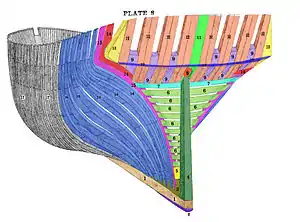Transom (nautical)
A transom is the vertical reinforcement which strengthens the stern of a boat.[1] This flat termination of the stern is typically above the waterline.[2]

Vertical transom and stern of a modern cargo ship
The term is known to have been used as far back as Middle English in the 1300s, having come from Latin transversus (transverse) via Old French traversain (set crosswise).[1]
The stern of a boat is typically vertical. It can be raked such that there is an overhang above the water, as at the bow. A reverse transom is angled from the waterline forwards.[3]
Transoms can be used to support a rudder, outboard motor, or as a swimming and access platform.
Gallery
 Flat transom on a dinghy with mount points for a rudder.
Flat transom on a dinghy with mount points for a rudder._-_geograph.org.uk_-_1381157.jpg.webp) Raked transom with rudder mount points.
Raked transom with rudder mount points. Reverse transom with rudder mounted under the hull.
Reverse transom with rudder mounted under the hull. Transom-mounted outboard motor.
Transom-mounted outboard motor. Reverse transom with access platform.
Reverse transom with access platform. Traditional timber construction with horizontal transom members in pale green and turquoise.
Traditional timber construction with horizontal transom members in pale green and turquoise.
References
- "transom". Merriam-Webster. Retrieved 2 November 2019.
- "transom". Dictionary.com. Retrieved 2 November 2019.
- Jordan, Richard (19 September 2009). "Stern Styles and Transom Types – Sugar Scoop, Reverse, Wineglass, Heartshaped, Canoe, Double Ended, Ducktail". Jordan Yacht Brokerage. Retrieved 2 November 2019.
This article is issued from Wikipedia. The text is licensed under Creative Commons - Attribution - Sharealike. Additional terms may apply for the media files.